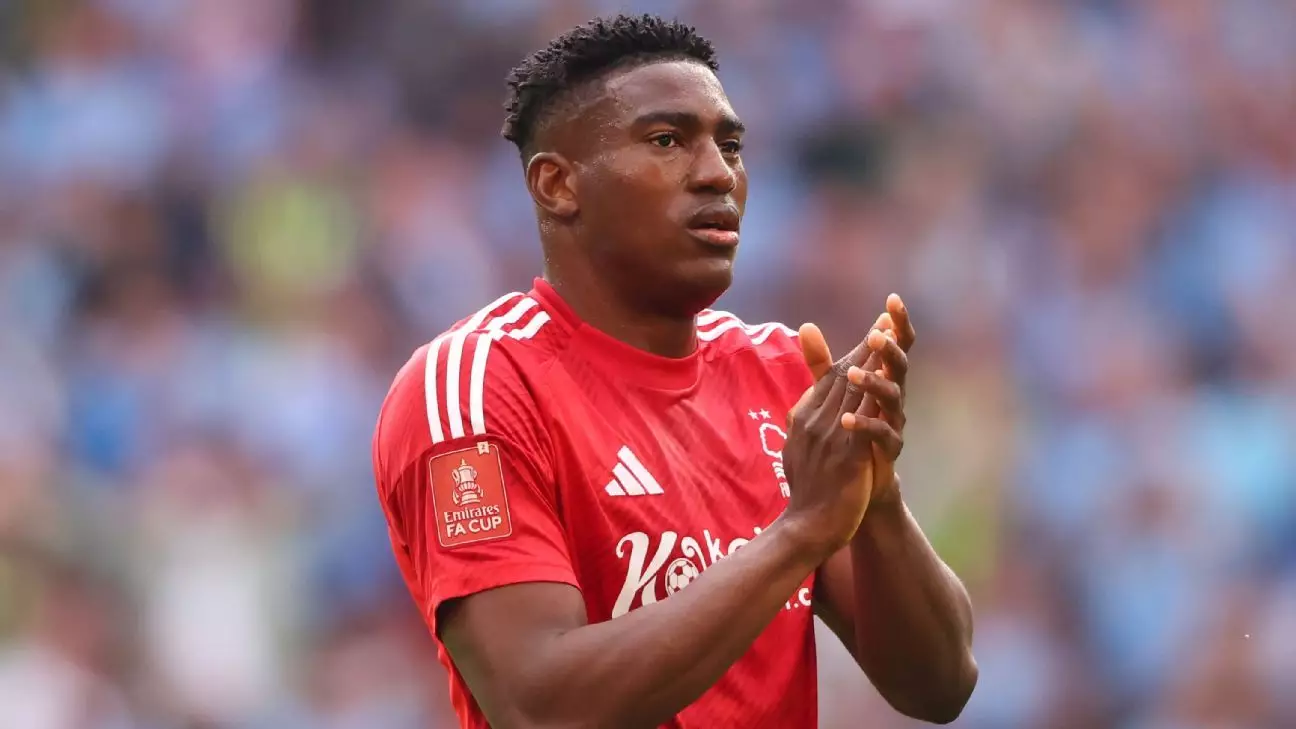The football world was shaken by the distressing news regarding Nottingham Forest striker Taiwo Awoniyi, who now finds himself in an induced coma following urgent surgery for an abdominal injury sustained during a match against Leicester City. As a second-half substitute, Awoniyi collided with the goal frame, a moment that marked not only the turning point of the match—a tightly contested 2-2 draw—but also the beginning of a troubling health crisis. This incident has raised poignant questions about player safety and the responsibilities of management across the sport.
The Aftermath and Controversy Around Player Safety
Awoniyi’s injury prompted on-field discussions that have ignited a debate about athlete welfare, illustrating a critical need for urgent communication between coaching staff and medical personnel. It was reported that after receiving initial treatment, the player indicated he was fit to continue. However, as the match progressed, it became evident that he was not in a condition to contribute effectively, hampering Nottingham Forest’s chance at securing a crucial victory. This situation left the team effectively playing with ten men—a tactical disadvantage that underscores the precariousness of player health versus competitive pressure.
In the aftermath, emotions escalated, culminating in a confrontation between club owner Evangelos Marinakis and manager Nuno Espirito Santo. Such incidents underscore a troubling reality: athletes may prioritize their return to the game due to a mix of professionalism and the unending pressure of performance, often at the cost of their health. This episode encourages reflection on how clubs balance the urgency of sporting success with the medical imperative of protecting players.
The Human Element of Leadership
Remarkably, Marinakis’s tumultuous reaction was framed by Nottingham Forest’s official statement as a testament to his leadership—underscoring a passionate commitment to the welfare of the players. The emotional investment demonstrated by Marinakis, who ventured onto the pitch in visible frustration over Awoniyi’s condition, raises important questions about management’s role during such crises. The juxtaposition of sporting ambition with genuine concern for player health paints a complex picture of responsibility within the club’s hierarchy.
“It became increasingly difficult for him to stay on the sidelines,” noted the club, asserting that Marinakis’s actions were instinctive and human. This candid portrayal of a club’s owner caring for his players is equally refreshing and concerning; it highlights a need for structured protocols regarding player injuries, so that leaders can act decisively without the emotional turmoil that often accompanies such moments.
The Road Ahead: Implications for Nottingham Forest
Looking forward, Awoniyi’s recovery remains a pivotal concern not just for the player but for the team itself. Nottingham Forest is on the cusp of competing for a cherished spot in the UEFA Champions League, currently sitting just one point behind fifth-placed Chelsea with two rounds left in the season. The stakes could not be higher; the ramifications of this injury extend beyond Awoniyi’s personal health—they could determine the future trajectory of the club in terms of talent acquisition, sponsorships, and overall league standing.
As the team navigates the final challenges of the season, every player’s contribution could be critical. The club’s ambition to qualify for the prestigious Champions League highlights the pressure that players are under, especially in the wake of serious injuries like Awoniyi’s. With champions often defined by their strength in adversity, Nottingham Forest now faces a test of resilience.
Reassessing Athletic Responsibility
This incident brings to the forefront pivotal discussions surrounding athlete safety and the need for regulated procedures during matches. The dichotomy between a player’s desire to contribute and the necessity of ensuring their long-term health demands a re-evaluation of protocols on the pitch. Medical staff must have enhanced authority and clearer communication channels to prevent mishaps such as the one that occurred with Awoniyi.
Awoniyi’s case stands as a critical reminder of the sacrifices made by professional athletes and the heavy toll competitive sports can take on their lives. It calls not only for introspection from team management but also for an increased emphasis on education and awareness around sports injuries. The football community must ensure that moments like Awoniyi’s do not cloud sporting legacies but instead, catalyze reforms that protect the well-being of players while allowing them to excel on the field.

Leave a Reply